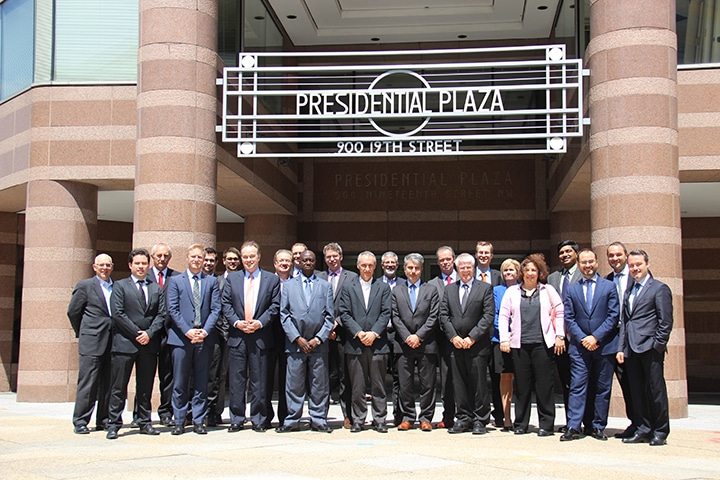
The first joint Project Steering Committee meeting of the en.lighten and the new United for Efficiency, U4E, initiatives was held on 15 May 2015 at the Global Environment Facility’s (GEF) Headquarters in Washington D.C. Jointly convened by the GEF Secretariat and the United Nations Environment Programme (UNEP), participants from 20 public and private sector partner organisations attended the meeting, including the United Nations Development Programme (UNDP), Sustainable Energy for All, World Bank, International Copper Association (ICA), CLASP, Natural Resources Defense Council (NRDC), Southern African Power Pool, South Africa’s national utility Eskom, as well as leading manufacturers of lighting, appliances and equipment such as Philips, OSRAM, ABB, Arcelik, BSH Group, Electrolux, and MABE.
Both initiatives constitute the engines of the SE4ALL Accelerators on lighting (en.lighten) and appliances and equipment (U4E). UNEP estimates that electricity consumption for lighting, appliances and equipment will amount to over 50% of global electricity consumption by 2030. These initiatives are joining forces to assist countries in leapfrogging to high efficient lighting, appliances and equipment and reducing considerably its electricity consumption and climate impacts.
The meeting took stock of the progress achieved by both initiatives in the past twelve months. en.lighten has directly supported over 50 countries and is working with several regions, including the Association of Southeast Asian Nations (ASEAN), the Economic Community of West African States (ECOWAS) and Middle East and North Africa to develop and/or implement regional efficient lighting strategies. One billion people in close to 50 countries are using more efficient products, thanks to the support en.lighten provided. U4E has mobilised the commitment of countries, in particular in Latin America and the Caribbean and Southern Africa, as well as the support of private sector partners for a global transition to energy-efficient products.
Participants discussed how to best build synergies between en.lighten and U4E that will ultimately catalyse action by governments to transform their markets to high-efficiency products. This is of particular importance in the run-up to the 21st Conference of Parties (COP 21) of the United Nations Framework Convention on Climate Change (UNFCCC) in December in Paris, where a new international climate agreement is expected to be adopted, and where governments will announce their ambitions and actions to mitigate climate change. Since its creation in 2010, 66 countries around the world have joined the UNEP-GEF en.lighten initiative to put in place integrated policies phasing-out inefficient incandescent lamps. en.lighten is supported by many partners, including two leading efficient lighting manufacturers OSRAM and Philips Lighting.
The joint meeting also provided strategic guidance on the way forward of both initiatives, highlighting the importance of coordinated regional approaches as a means to achieve a fast transition to efficient lighting, appliances and equipment. The en.lighten model is now taken on a new level through U4E, extending the scope to other appliances and equipment offering a high potential for significant electricity and greenhouse gas emissions savings. These products include residential refrigerators, room air conditioners, electric motors, distribution transformers and information and communication technologies. en.lighten will broaden its scope to accelerate the deployment of LEDs, and to efficient commercial, industrial, and outdoor applications.
For more information please see: http://www.enlighten-initiative.org/
Contact:
Kornelia Guse
Communications and Partnerships coordinator
en.lighten initiative
United for Efficiency, U4E
Tel: +33 1 44 37 16 33
Kornelia.guse@unep.org
United Nations Environment Programme
Division of Technology, Industry and Economics
Energy, Climate, and Technology Branch